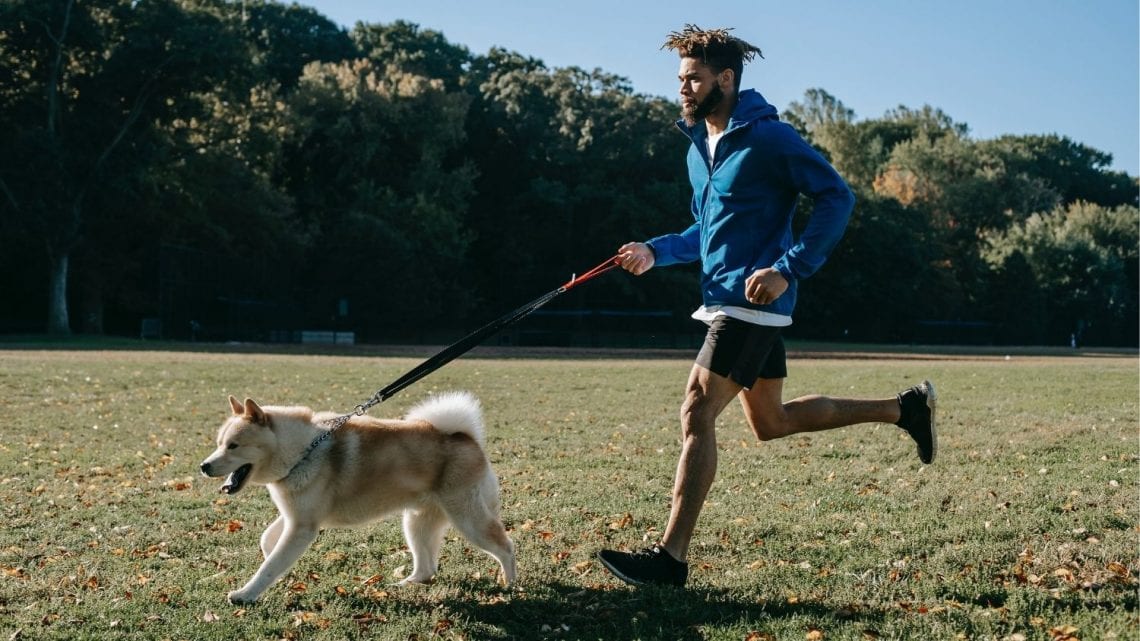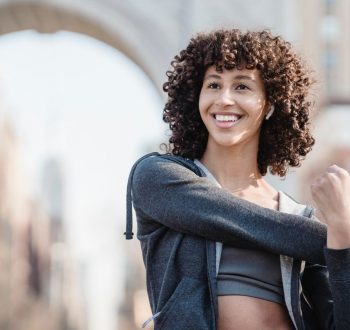
10 Ways to Make Outdoor Exercise More Fun When You’re By Yourself
Guest post by freelance journalist Caroline Abbott.
It’s very important for our physical and mental wellbeing that we take the opportunity to exercise while coronavirus restrictions are in place – even when it’s cold or wet, or we’re bored of seeing our local area.
We’ve put together a list of 10 ideas that could make a walk, run or cycle around your neighbourhood more interesting, to encourage you to get your daily exercise in the fresh air.
Why is it so important to exercise at the moment?
It has been estimated that our average step count has halved during lockdown, as we’re spending more time at home and many of us aren’t commuting to work or doing the school run.
‘Lockdowns during the ongoing Covid-19 pandemic mean that many of us are spending more time being physically inactive,’ said Dr Folu Oluwajana, a GP and fitness trainer who co-founded the holistic wellness clinic Mahaah.
‘Regular exercise is well-known for being a key aspect of maintaining good physical health,’ she said. ‘It reduces your risk of certain conditions in addition to maintaining strong muscles, bones and joints. It also improves the function of your immune system and your brain.
‘Physical inactivity, or being sedentary, is an independent risk factor for many chronic diseases such as diabetes, high blood pressure, stroke, heart disease, osteoporosis and some cancers. For example, even if you have a balanced healthy diet, do not smoke and limit alcohol, if you are physically inactive your risk of poor health is still increased. Physical inactivity is also associated with weight gain and musculoskeletal problems such as back pain. Breaking up sedentary time can be a useful way of counteracting these risks.
‘Alongside its physical benefits, exercise is also proven to have a positive impact on our mental wellbeing. It is associated with improved mood, reduced stress and better sleep. Endorphins released during exercise make us feel happier and relaxed – another important reason to stay active during lockdown.’
How much exercise should we be doing, and what type?
Public Health England recommends that adults aged 19 to 64 do some physical activity every day. They should aim for at least 150 minutes of moderate exercise each week, or 75 minutes of vigorous exercise, or a combination of the two.
Dr Oluwajana said that during moderate-intensity exercise, you should be working hard enough that your heart and breathing rate are increased but you can still speak in full sentences. Vigorous-intensity exercise is harder and you won’t be able to speak in full sentences.
‘The recommendations are a good guide but even 10 minutes of exercise a day has been shown to have health benefits, so if you are new to exercise, don’t be worried about starting small,’ she said.
Dr Oluwajana said adults should aim to include some strength and flexibility activities into their routine twice a week. ‘This includes activities such as yoga, pilates or resistance training with weights, bands or even household items,’ she said. ‘In general, try to be active daily, whether you go for a walk, do some stretching or do a high-intensity workout. Any regular activity is good for you, and more is better.’
Mental health professional Lou Campbell, who is a stress and anxiety management specialist, sleep therapist and mindfulness teacher, strongly recommends regular exercise for everyone, particularly through the winter months when our serotonin levels can get low due to the lack of daylight.
‘Outdoor exercise in daylight hours is particularly useful because it increases the amount of daylight coming in through our eyes,’ said Ms Campbell, who is the co-founder and programmes director of Wellbeing Partners and Mindfulness in the Workplace. ‘This boosts our serotonin levels which enhances mental health, increases emotional resilience and improves our sleep.’
She recommends 30 to 45 minutes of brisk walking, cycling or running per day. ‘Cardio exercise stimulates our serotonin, endorphins and, for runners with good fitness levels, endocannabinoids,’ she said. ‘These neurotransmitters increase our feelings of positivity, contentment and connectedness to ourselves and others. After 45 minutes, these neurotransmitters stop being stimulated.’
She agrees that people should do one or two 20-minute sessions of muscle strengthening exercises per week. ‘This stimulates our dopamine which enhances confidence, mental resilience and gives us a sense of achievement,’ she said. ‘For people low in confidence, motivation and self-esteem, muscle strengthening exercises can be extremely helpful.’
Ms Campbell suggests starting each day with stretching exercises for 10 minutes. ‘It gives us micro-doses of endorphins which make us feel positive and help our serotonin to function more efficiently,’ she said.
For people with high levels of anxiety, she recommends yoga. ‘It stimulates gamma aminobutyric acid, a neurotransmitter which makes us feel calm,’ she said. ‘It can be useful to finish off a yoga session with a meditation from the Mindfulness UK app.’
How to make your outdoor exercise sessions more fun
So, now that we know why we should exercise and how much to do, how can we motivate ourselves to go out and pound the same old streets? Here are some ideas.
1. Download an app to turn your outing into an adventure
You could transform your walk or run into a fun game with the help of a GPS-enabled smartphone. In Zombies, Run! (zombiesrungame.com) you’ll find yourself in the middle of a zombie epidemic, gathering supplies and rescuing survivors while trying to avoid the zombies chasing you. Join the world’s largest treasure hunt with the Geocaching app (geocaching.com) or catch Pokemon in the real world with Pokemon Go (pokemongo.com).
2. Get some virtual exercise buddies
It can be particularly hard for people who live alone to motivate themselves to do things they don’t really want to do, even if they know they should do them. Apps like Strava (strava.com) and Map My Walk (mapmywalk.com) have a community element where people can link up with other walkers, runners and cyclists, offer each other encouragement and support, and set each other challenges. Or you could just make a pact with a friend to exercise at a specific time, and contact each other to make sure you’re sticking to the plan. Being accountable to somebody else makes you much more likely to see something through.
3. Make ‘GPS art’
Use a tracker app like Map My Run (mapmyrun.com) to trace a particular shape on a digital map. You could try to spell out your name, or draw an animal or a body part. The drawing will dictate the route you take and you might discover somewhere new.
4. Make a ‘Where am I?’ quiz for your friends
Keep your eyes peeled for a unique feature on your journey, take a photo of it without any background that would give a clue as to its location, share it with your friends, family, colleagues or neighbours and ask, ‘Where am I?’ It could be anything from a gargoyle to an unusual garden gnome. If your friends pose a similar question for you, it will encourage you to take more notice of your surroundings.
5. Play the Alphabet Game
There are two versions of this game that you could play. You could look for the letter A written anywhere, such as a vehicle registration plate, house or shop name, or advert, and then move onto the letter B and continue through the alphabet. A harder version of the game is to look for things beginning with each letter of the alphabet from Apple tree to Zebra crossing.
6. Challenge yourself
Set yourself a challenge and reward yourself if you achieve it. You could aim to beat your previous time or go a further distance, or you could simply make yourself a promise to walk around the block every day of the week, no matter what the weather. Put 50p or £1 in a jar every time you do it, and you’ll soon have enough to treat yourself to something nice to eat, some new clothes or whatever motivates you.
7. Go your usual route but in the opposite direction
Going in the opposite direction to normal can feel like you’re going somewhere new. You’re bound to see things you haven’t seen before because they’re usually hidden behind a hedge or fence until you’ve walked past them.
8. Listen to something while you exercise
Listening to a podcast or audiobook while you exercise can make the time seem to pass a lot quicker, so this might be a good idea if you’re not a big fan of exercising.
9. Fantasise
This is another way to encourage you to look more closely at your surroundings. Focus on a house ahead of you. Would you like to live there? Why or why not? If you had to pick one of its features to have on your own property, which would it be? Who do you imagine lives there – is it a family with small children, elderly couple or young professional? What can you see or hear that makes you think that?
10. Hand over responsibility for your route
Let your dog or the toss of a coin decide whether you go left or right at each junction, and see where you end up. Apparently the average adult makes 35,000 conscious choices each day. This will take a little bit of the pressure off.
Final thoughts
Exercise is particularly important at the moment, for both our physical and mental health. With a little creativity, there are plenty of ways to shake up our exercise regimes and restore our enthusiasm to get outdoors, no matter what our fitness level.
By Caroline Abbott
Caroline Abbott is a freelance writer and journalist based in Torquay, Devon. She writes news and features for newspapers, magazines and websites. She also has her own blog and email newsletter.
Caroline spent a decade working as a journalist for local newspapers including Exeter’s Express and Echo, the Crediton Gazette and Torquay’s Herald Express – and their website, Devon Live. She wrote on a wide range of subjects including business, health, local government, education, crime and leisure.
Caroline was motivated to go self-employed after getting a puppy. When she’s not working, she is usually exploring the beautiful South Devon coast and countryside with her dog.
If you enjoyed this then you might also enjoy 10 science-backed things you can do to feel better, right now. Want more on motivation and healthy living when you live alone? Sign up for our fortnightly newsletter.





